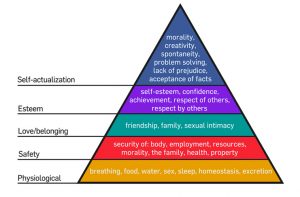A LITTLE over a month ago, my pet cat, named Behemoth, after a character from Mikhail Bulgakov’s “The Master and Margarita,” gave birth to three kittens. Things were fine, initially, as they displayed typical newborn behaviour. However, after a while, they became less interactive and stopped drinking the milk that had been set out for them.
They played less and just huddled in a corner of the house. I googled these strange symptoms and realised that the time had come for the kittens to be weaned. They were ready to transition to solid food and they had become lesser versions of themselves because the correct food had not been laid out for them. I can use this scenario as a metaphor, because I myself, as many other writers are, I’m sure, prone to experiences and situations that make me a lesser version of myself. For example, the lease on my apartment expires at the end of the month and I will be forced to find a new home. There is nothing more taxing than moving and everything that comes with it: actually finding affordable living space, having to pay two months’ rent and a security deposit upfront, shifting everything you own from one place to another, meeting new neighbours and establishing new bonds even as you say goodbye to previously established ones, figuring out new routes to work, to the market, etc. In both the case of the kittens and myself, specific needs were/are not being met and, therefore, we were/are unable to perform/function at the best of our abilities. As a writer myself, I was forced to ask several important questions at this realisation. What about writers who are in more dire situations than myself? How do they write, knowing that they have children to take care of but no permanent home, or that there is a manuscript to be finished, but there is no food to put on the table? Basically, can writers write while living in the situations offered by a third-world country such as Guyana, and does the response to this question influence our understanding of why there are so few writers in our country despite the obvious presence of people who have the talent, as well as our long literary heritage? Furthermore, does the answer address the phenomenon of Guyanese-born writers being more successful abroad than they would have had they remained in Guyana? To place all of this within context and to try to establish a singular answer to these questions, we must turn to Maslow’s Hierarchy.
Abraham Maslow was a psychologist known for his development of Maslow’s Hierarchy of Needs, as well as his work on self-actualisation and positive psychology. His hierarchy presents a pyramid of human needs, each building on top of the one that came before it until the pinnacle of the pyramid is attained through self-actualisation. The base of the pyramid is made up of physiological needs, safety, love and belonging, and then esteem and, finally, self-actualisation. Without physiological needs and a sense of safety (through having food, home, a mode of income), then it is impossible to truly access the next rung of the tier – which makes sense, because someone without a place to live can never really feel safe and will never actually belong anywhere – and, therefore, several steps towards self-actualisation (whether through writing or some other means) cannot be attained unless the base of the pyramid is fulfilled.
In Guyana, writers are poor – forced to work several jobs to put food on the table, forced to scrape out a living, paycheque by paycheque, so that they can take care of themselves and their families. Where is a local writer supposed to find the time or energy or motivation or creativity that is necessary to write in an environment that cannot ensure that the writer will have a bed in the morning, or a roof that doesn’t leak when it rains, or a tennis roll to eat for lunch the next day, or a solid eight hours’ worth of sleep when the night comes? Such an environment is not at all conducive to writing and this is one of the most significant reasons for the dearth of creative writing in Guyana. I know that earlier this year, grants from the Department of Culture were distributed to several creatives in various sectors. While this is helpful, it is one temporary method of alleviating financial burdens that are imposed on people who live in Guyana. The plans for real, possible, long-term solutions, if any, are not forthcoming and I worry that with the rise of the interest in oil that has been discovered offshore, there has been an increase in attention towards oil and gas-based projects and scholarship opportunities, which will undoubtedly lead to a decline in the same for those of us in the arts. If this continues, within a few years, Guyana will be a cold, soulless country, filled with people who know much about science and technology, and nothing about what it means to be human.




.png)










